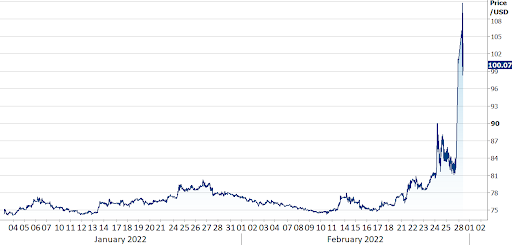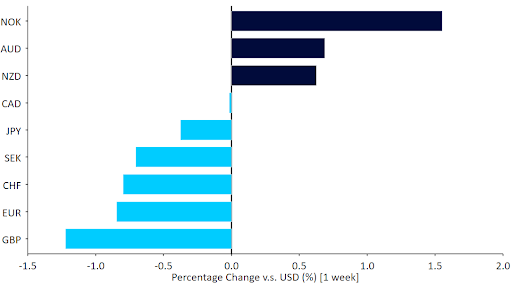Russian invasion of Ukraine upends world markets
In the end, US intelligence warnings were fully vindicated as Putin launched a full-scale invasion of Ukraine on Thursday.
FX Market Updates
In the end, US intelligence warnings were fully vindicated as Putin launched a full-scale invasion of Ukraine on Thursday.For the next two days, markets girated wildly, but a sense that Western sanctions would avoid cutting Russia off entirely from the financial world fuelled a late rally on Friday on most risk assets. As this is written, this is already outdated, as Western sanctions escalated over the weekend and Putin put nuclear forces on alert. We have seen a fresh flight to safety and a complete collapse of the Russian rouble, which was down by almost 30% against the US dollar at one stage this morning.Figure 1: USD/RUB (YTD) Two themes could be discerned from last week. First, the US dollar is back as the safe-haven of choice among investors. The Swiss franc and the Japanese yen outperformed, albeit to a much lesser extent. Second, commodities rallied, led by the energy complex, as did the currencies of commodity exporting countries, with the obvious exception of the ruble. The Norwegian krone rose sharply against almost every other currency in the world.Currency markets now will be driven by the developments out of Ukraine and Russia, but also the reaction of the world's central bank to the crisis, which will likely exacerbate inflationary pressures while also adding downside economic risks, particularly in Europe. The outlook is extremely uncertain, but we will do our level best to keep you posted on key developments.Figure 1: G10 FX Performance Tracker (1 week)
Two themes could be discerned from last week. First, the US dollar is back as the safe-haven of choice among investors. The Swiss franc and the Japanese yen outperformed, albeit to a much lesser extent. Second, commodities rallied, led by the energy complex, as did the currencies of commodity exporting countries, with the obvious exception of the ruble. The Norwegian krone rose sharply against almost every other currency in the world.Currency markets now will be driven by the developments out of Ukraine and Russia, but also the reaction of the world's central bank to the crisis, which will likely exacerbate inflationary pressures while also adding downside economic risks, particularly in Europe. The outlook is extremely uncertain, but we will do our level best to keep you posted on key developments.Figure 1: G10 FX Performance Tracker (1 week)

 Two themes could be discerned from last week. First, the US dollar is back as the safe-haven of choice among investors. The Swiss franc and the Japanese yen outperformed, albeit to a much lesser extent. Second, commodities rallied, led by the energy complex, as did the currencies of commodity exporting countries, with the obvious exception of the ruble. The Norwegian krone rose sharply against almost every other currency in the world.Currency markets now will be driven by the developments out of Ukraine and Russia, but also the reaction of the world's central bank to the crisis, which will likely exacerbate inflationary pressures while also adding downside economic risks, particularly in Europe. The outlook is extremely uncertain, but we will do our level best to keep you posted on key developments.Figure 1: G10 FX Performance Tracker (1 week)
Two themes could be discerned from last week. First, the US dollar is back as the safe-haven of choice among investors. The Swiss franc and the Japanese yen outperformed, albeit to a much lesser extent. Second, commodities rallied, led by the energy complex, as did the currencies of commodity exporting countries, with the obvious exception of the ruble. The Norwegian krone rose sharply against almost every other currency in the world.Currency markets now will be driven by the developments out of Ukraine and Russia, but also the reaction of the world's central bank to the crisis, which will likely exacerbate inflationary pressures while also adding downside economic risks, particularly in Europe. The outlook is extremely uncertain, but we will do our level best to keep you posted on key developments.Figure 1: G10 FX Performance Tracker (1 week)
GBP
Sterling had a particularly difficult week, falling sharply against every other G10 currency. The pound briefly fell below the 1.33 level on the dollar on Thursday, although it has at least stabilised following the sell-off. In addition to the flight from risk, Bank of England officials tried to downplay the importance of the four MPC votes in favour of a 25 basis point hike at its last meeting. Financial markets continue to fully price in a hike at the BoE’s next policy meeting in March, although investors now see little to no chance of a 50 basis point move in rates.Not much news on tap this week, which means sterling will trade mostly in line with risk assets, which is to say, geopolitical developments.EUR
The key question for the euro now becomes the extent to which the ECB delays tightening in response to war in Ukraine. The harsher sanctions announced over the weekend increase the risk of disruption of Russian energy supplies to Europe, which will be both inflationary and detrimental to production capacity across the economy, a nasty mix the response to which is not immediately obvious.Ordinarily the February inflation data out Wednesday would dominate the week, but obviously the developments in Russia and Ukraine and the reaction from ECB officials will be far more important this week.USD
The US is a relatively self contained economy and not dependent on Russia for energy supplies. It is, therefore, likely to wear any long-term economic fallout from the Ukraine war and the draconian sanctions announced by the West relatively better, and hence is not surprised that the dollar is the safe-haven of choice among the major currencies. Last week we had yet another upward inflation surprise, this time in the PCE number.This week's nonfarm payrolls number is shaping up to be very strong as well, with sharp wage pressures. As in the case of the ECB, there remains considerable doubt as to whether the Fed can really afford to delay the removal of accommodation in the face of yet another inflationary shock. Chair Powell testimony to Congress on Wednesday and Thursday should provide some clarity here, and we regard it as the key event of the week, in addition of course to the developments around the Russian invasion of Ukraine.CHF
The Swiss franc initially jumped on the news of the Russian invasion of Ukraine due to its safe-haven status, although it ended the week roughly in the middle of the G10 dashboard, underperforming the commodity currencies, the Swedish krona and the US dollar. Still, on Thursday, EUR/CHF fell below the 1.03 mark to its lowest level since 2015, and the Swiss currency remains one of the strongest in Europe.News that Switzerland is considering the adoption of EU sanctions and is likely to freeze Russian assets was quite surprising considering the country’s historical neutrality. This both adds to the gravitas of the situation, and further strengthens the West’s response to Russian aggression. While the Swiss economic calendar this week is quite rich, and includes February CPI inflation data (out on Thursday), we’ll continue to focus primarily on the Russia-Ukraine conflict. Should risk sentiment continue to deteriorate further, we may see an additional strengthening of the Swiss currency.





